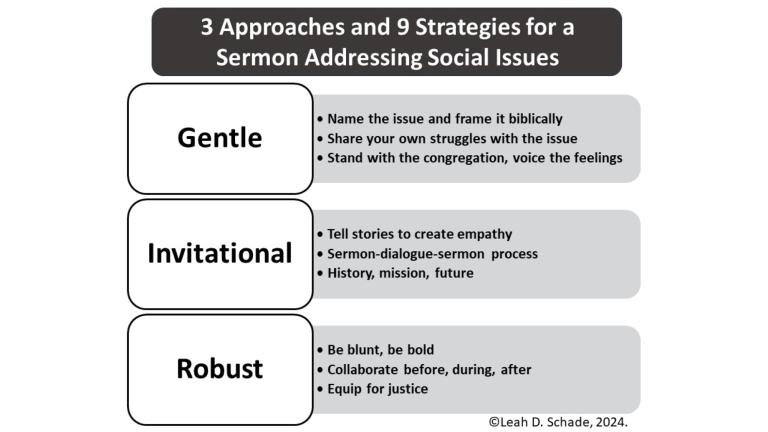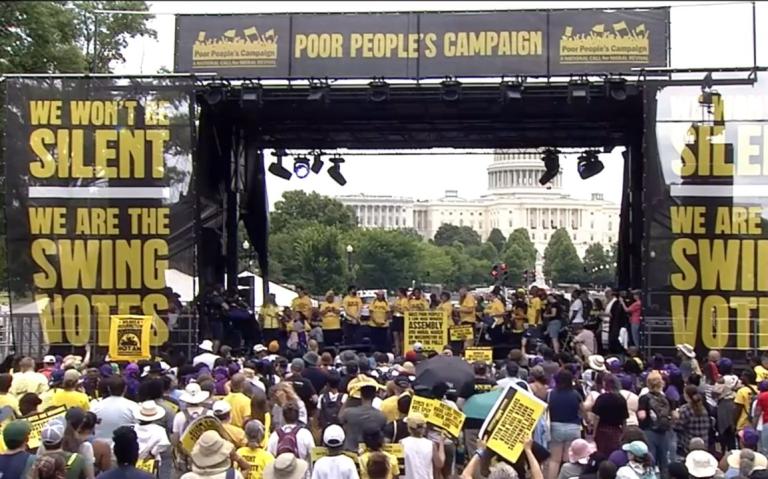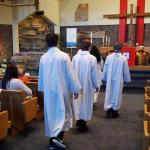Mark 10:46-52 is the Gospel reading in the Revised Common Lectionary for Oct. 27, just two Sundays before Election Day. Here are election season sermon ideas using Gentle, Invitational, and Robust approaches.

[If you’re preaching instead on John 8:31-36 for Reformation Sunday instead, see this article: https://www.patheos.com/blogs/ecopreacher/2024/10/preaching-reformation-sunday-election-season-john-8-31-36/]
[Did you miss the sermon ideas for Oct. 20? Click here!]
Before we examine Mark 10:46-52 and how it might shape a sermon during the election season, I want to explain that preachers can address issues related to the election.
Preachers are free to discuss the themes and issues relevant to an election – as long as they refrain from endorsing specific candidates. In fact, many congregants appreciate when their ministers offer biblical, theological, and ethical insight on social issues that impact their lives, families, and communities.
In this article, I explained the do’s and don’ts of what clergy and congregations can say and actions they can take when it comes to politics.
Keep in mind that the biblical writers spoke to the social and political issues of their time because God is concerned with the well-being of all people. This means that it’s not only permissible for preachers to discuss the election, but it is also their moral and ethical duty to relate the Bible and theology to the issues that are relevant today, particularly as people prepare to exercise their right to vote.
But HOW a preacher talks about the election in their sermon also matters.
I developed an Assessment Tool for preaching and social issues which you can take here. This 5-minute online tool will help you think about your approaches to preaching and social issues using a three-dimensional questionnaire that measures: (1) your own vulnerabilities and strengths, (2) the characteristics of the congregation you serve, and (3) the quality of relationships within the congregation and between the congregation and yourself.
Gentle, Invitational, and Robust Approaches
Based on your score from the Assessment Tool, you’ll see that I suggest three approaches to a sermon addressing a social issue: Gentle, Invitational, and Robust. This is a framework I developed for my book Preaching and Social Issues: Tools and Tactics for Empowering Your Prophetic Voice to help ministers choose which path works best for them and their context.
- The Gentle approach is for clergy who are in situations where there may be personal or congregational stress, the congregation is new to sermons addressing social issues, or there is vulnerability on the part of the preacher.
- The Invitational approach is for congregations that are ready for a more challenging message by way of dialogue and building bridges of listening, empathy, and understanding.
- The Robust approach is for clergy and congregations who are ready to fully engage in public theology and to put their faith into action on social issues.
I suggest three strategies for each, for a total of nine in all. You can read about these approaches in more detail in my book. In the meantime, here’s a graphic with a quick summary:

For this installment on election season sermon ideas, we’ll look at Mark 10:46-52. I’ll begin with a brief exegetical summary of the passage and suggest connections to election issues. Then I’ll offer Gentle, Invitational, and Robust sermon ideas that you can use in your preaching context.
Oct. 27, 2024: Twenty-third Sunday after Pentecost: Mark 10:46-52
Exegetical summary
The famous line from the hymn, “Amazing Grace,” comes to mind when encountering the story of Jesus healing Bartimaeus: “Was blind but now I see.” We want to be cautious, however, about making blindness the focus of this passage, given the implications for our neighbors with vision problems and actual blindness. Instead, we can concentrate on two fundamental questions:
Who gets our attention? And how do we respond to those in need who demand our attention?
In the story, Bartimaeus is initially relegated not just to the sidelines but to the gutter by the side of the road. No one pays attention to that place of tossed-out garbage unless it becomes too much to ignore. As it happens, Bartimaeus does exactly that – he makes himself too loud to be ignored. Even when the disciples and accompanying crowd try to silence and dismiss him, Bartimaeus persists.
Hearing himself addressed as “Son of David” for the first time stops Jesus in his tracks. While Bartimaeus lacks physical vision, he certainly possesses the ability to recognize who Jesus is and the healing he is capable of giving. But Jesus does not assume to know what Bartimaeus wants. He asks, “What do you want me to do for you?”
Notably, Jesus does not take credit when Bartimaeus regains this sight. Instead, he tells him that his faith has made him well. Bartimaeus’s trust in the power and goodness of Jesus enables him to see with his own eyes. In turn, he follows Jesus without hesitation.
Connections to election issues
During this election season, we must ask: who is calling out for help from the side of the road? Which individuals and groups are cast aside like inconvenient trash as the rest of the world speeds along the highways to their destinations? Who is standing alongside Bartimaeus requiring our attention as we engage in political conversations and debate public policies?
Certainly, many congregations can point to ministries that assist people like Bartimaeus. Ministries of feeding, clothing, financial assistance, and housing are shining lights in many communities. Congregations can build on this by exploring how they can help these folks be seen and heard by those who create laws and enact policies that affect their lives.
For example, the Poor People’s Campaign intentionally centers the people who have borne the brunt of policies that enrich some while tossing others to the side of the road. On July 14, 2024, poor and low wage workers gathered in Washington, DC to make their voices heard at The Mass Poor People’s & Low Wage Workers’ Assembly & Moral March on Washington, DC and to the Polls. The vision of this movement is to have the poor and disenfranchised set the agenda for public policy.

Any movement to assist those with needs would do well to follow Jesus’s example of not assuming to know what would be most helpful. Just as Jesus stopped, turned his attention to Bartimaeus, and asked him want he wanted, so we, too, must give voice and agency to the people in need in our own communities. Such an approach builds bonds of trust and relationship, just as Jesus had with Bartimaeus.
Gentle approach: Name the issue and frame it biblically.
Some congregations may initially be resistant to the idea of engaging in advocacy on justice issues. So, the story of Bartimaeus makes the case that when it comes to those in need, the church’s role is to do more than simply comfort them as they remain on the sidelines. Instead, congregations can take part in or even host community listening sessions to learn what the needs are and what would be most helpful.
Just like the disciples and crowd in Mark 10:46-52, we can transition away from silencing those in need. Instead, we can encourage and accompany them as they throw off their cloaks of despair, helplessness, and hopelessness. We can help to amplify their voices and empower them to claim their self-worth and belovedness.
Invitational approach: Tell stories to create empathy.
Congregations can host community listening sessions to discern local needs. You might call it a “Bartimaeus Gathering” and invite local neighbors and community groups to attend. Ask people to share what they think are the most pressing challenges facing the community. If possible, use a skilled facilitator to moderate the conversation so that people talk and listen without judgment
The sermon can include vignettes of what people shared (obscuring personal details to protect privacy) and invite the congregation to reflect on what they hear in these stories. The preacher can then suggest that the congregation take next steps such as participating in a community organizing effort to follow up with action on one of the issues raised.
In this way, congregations can build meaningful relationships with their communities and develop targeted ministries that address real needs. Check out the Community Tool Box for step-by-step instructions for conducting public forums and listening sessions.
Robust approach: Equip for justice.
For congregations who either know what it’s like to have been cast to the side of the road, or who are convicted of their obligation to help their neighbors, a more robust approach to a sermon on Bartimaeus is in order. In this case, a preacher could help equip their congregation for justice by articulating a plan that emerged from the listening session.
Once an issue is identified, the minister can call for their congregation to either claim their “Bartimaeus voice” or amplify that voice with their neighbors in need. Perhaps the plan involves partnering with local organizations, visiting with local elected officials, or organizing a protest event to raise awareness.
Whatever the next steps are, Mark 10:46-52 can provide the biblical framing for the action. With Bartimaeus, we begin by calling out to Jesus for mercy – publicly and with loud persistence! Then, in a public event, people can bring cloaks or coats with the issue emblazoned on the fabric and symbolically throw off their cloaks. Imagine cloaks with the word “homelessness” or “poverty” or “mental health” or “opioid crisis” being laid at the feet of community leaders. The session should include a clear “ask,” just as Bartimaeus made of Jesus. The demands of the church and local partners should be concise and actionable, while also including a date by which the community expects a response.
Bottom line – Speak and listen with the compassion of Jesus
Whether pursuing the Gentle, Invitational, or Robust approach, every preacher can encourage their listeners to vote. By electing leaders who align with the intention to help those in need, we influence policies, budgets, and laws at the local, state, and national level. Elected officials have the power to allocate resources so that no one is tossed to the side of the road. Preachers can encourage their listeners to vote with Bartimaeus in mind so that the needs of all citizens are heard and met.
May God bless your discernment, dialogue, preaching, and ministry during this election season!
Stay tuned for sermon helps for Nov. 3!
Read also:
Election Season Sermon Ideas for Mark 10:35-45, Oct. 20
What Clergy Can Say (and Not Say) During the Election Season
Preaching 2024 Election – How will Clergy Navigate Issues?
Post-Election Messaging & Preaching: Red, Blue & Purple Church Tactics

The Rev. Dr. Leah D. Schade is the Associate Professor of Preaching and Worship at Lexington Theological Seminary in Kentucky and ordained in the ELCA. Dr. Schade does not speak for LTS or the ELCA; her opinions are her own. She is the author of Preaching and Social Issues: Tools and Tactics for Empowering Your Prophetic Voice (Rowman & Littlefield, 2024), Preaching in the Purple Zone: Ministry in the Red-Blue Divide (Rowman & Littlefield, 2019) and Creation-Crisis Preaching: Ecology, Theology, and the Pulpit (Chalice Press, 2015). She is the co-editor of Rooted and Rising: Voices of Courage in a Time of Climate Crisis (Rowman & Littlefield, 2019). Her book, Introduction to Preaching: Scripture, Theology, and Sermon Preparation, was co-authored with Jerry L. Sumney and Emily Askew (Rowman & Littlefield, 2023).













